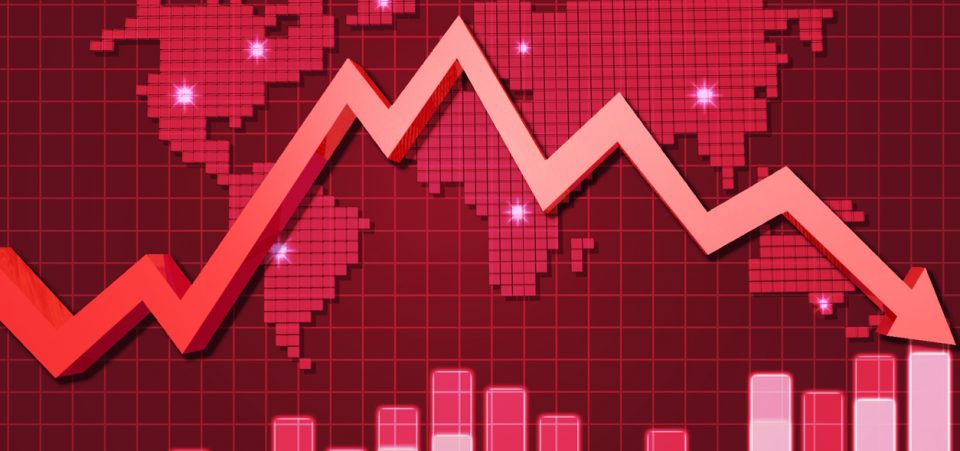Beige Book Suggests U.S. Businesses Fear Tariffs Will Trigger Economic Crisis
What’s the Beige Book? Chairman Mao’s Red Book and Colonel Gaddafi’s Green Book were more famous. But the Beige Book may soon become more infamous, because it predicts an economic crisis.
Indeed, to investors, the Beige Book will soon be less bland than its name suggests—at least as far as 2018 goes. Suffice it to say, the Federal Reserve publishes the book eight times a year to outline the quality of business conditions and economic activity in the United States.
Apart from its bland name, another reason you may not have heard of the Beige Book is that it rarely causes a fuss. Now, however, is one of those rare exceptions. That’s because President Donald Trump’s tariffs are going to submit the alleged 4.1% economic growth rate to a severe test.
The July 2018 Beige Book raises an important issue, the potential damage that the tariffs will generate—from bilateral and multilateral trade disputes to full-on trade wars. (Source: “Factbox: Tariffs remain top worry in Federal Reserve’s ‘Beige Book’ business survey,” Reuters, July 18, 2018.)
Trump’s Tariffs Are Hurting American Businesses in America
The very types of business that Trump promised to help during his campaign are the ones voicing the loudest fears that the tariffs will trigger an economic crisis.
Companies in the manufacturing and construction industries (well familiar to Trump) have started to report trouble spots in their networks. Production costs have increased, and reciprocating tariffs are now making their goods less competitive.
The tariffs, given their suddenness and scope, have disrupted tried and true supply chains.
Machinery manufacturers having to deal with new tariffs on steel, for example, will endure higher costs simply due to having to change suppliers. Panic can set in, causing disruptions.
Farmers Are Already Feeling the Pain
And then there’s the agricultural sector. The farmers of the Midwest who voted for Trump should brace for some buyer’s remorse, as it were.
China has enforced heavy duties on U.S. produce, seeds, and related items. In July alone, prices for agricultural exports dropped on average by 5.3%. That’s the biggest such decline since 2011. (Source: “Clear evidence Trump’s trade war is hitting U.S. farmers,” Yahoo! Finance, August 15, 2018.)
But for some products, such as soybeans, the price drop was as much as 14.1%. Corn, fruit, wheat, and other produce were also affected.
That may not seem important to some, especially when it comes to another economic crisis. However, it’s an important indicator that Trump may not be in a position to hold the tariffs indefinitely. America is not immune.
Many segments of the population—especially those who voted for Trump—will be economically hurt, while the others will see few, if any, benefits.
If farmers start losing, they will either demand more government subsidies or raise prices, pushing inflation higher. And that will cause the Federal Reserve to lift interest rates at a faster pace and to a higher level than it might have liked.
The effects of agriculture alone on interest rates should worry investors. Higher interest rates will encourage investors to abandon the high-risk equity markets and seek safer vehicles for their retirements, like U.S. Treasuries. Gold and silver could also become popular again.
When it comes to manufacturing, tariffs could make it more difficult to obtain quality steel and other raw materials. Quality would suffer while making products less cost-competitive.
Moreover, Trump’s tariffs are missing the target. They were meant to hit China in order to—allegedly—curb its overproduction of steel and aluminum. Instead, the tariffs are hitting U.S. allies such as Europe and Canada just as hard.
General Motors vs. Donald Trump: U.S. Auto Companies Challenge the President
Nowhere is this dichotomy more evident than in the case of automobiles. Trump’s plan to impose 20% or 25% tariffs on imported cars would create major problems for, wait for it: American car companies!
General Motors Company (NYSE:GM), Ford Motor Company (NYSE:F), and Fiat Chrysler Automobiles NV (NYSE:FCAU) all make cars in an internationally integrated fashion. They share and manufacture components in various locations. In other words, they depend on global production systems.
These companies, and their stocks of course, will suffer if Trump does not reconsider his plans to impose tariffs. And not just because affected countries will respond with reprisals against U.S. goods.
The Beige Book has started to reflect the panic that has set in about another economic crisis, even from the companies that would benefit from Trump’s goals to create more U.S. manufacturing jobs.
Will Turkey Be the Detonator of the Next Economic Crisis?
As Trump moves to punish China with tariffs and other countries with tougher sanctions—and maybe a war or two (e.g. with Iran)—the risk of a global economic crisis shall continue to rise.
Trump is hitting China at a time when the world’s next leading economic superpower has deepened its transformation from an export-driven economy to a domestic-demand-driven one. In other words, China is completing the next necessary step to officially join the rich-country club.
China needs to keep growing to achieve that goal. And it also needs investments to encourage and achieve the transformation. It will have to borrow more to do this. But credit has become far more expensive because of rising U.S. interest rates.
The higher interest rates put China’s growth plans at risk.
China has also become an importer of many foreign goods. Entire markets depend on it. For example, European luxury car manufacturers have started to consider the needs and desires of the Chinese consumer in their designs. It’s no longer the American consumer who dictates tastes.
Yet the U.S. interest rate hikes risk blowing up various economies in 2018 or 2019. Turkey, of course, but also Argentina and Italy, to mention a few. The economic time bombs are everywhere, and they all have the potential to trigger a crisis. In the short term, it appears that the Turkish lira may prove to be the detonator.
Defense Industry Is Still King
The one sector of the economy where Trump enjoys full support is defense.
On August 14, President Trump formally signed the fiscal 2019 defense budget. He approved seven percent more spending. That’s an unusual show of generosity, even for military budgets, and even though the record high occurred under Barack Obama in 2010.
The real novelty comes from outer space. The United States has formally re-entered the race to put weapons in space. And the 2019 budget provides for the creation of the newest—and sixth—branch of the U.S. military: the Space Force.
Defense sector stocks will be the ones with the best chance of surviving the next economic crisis.






